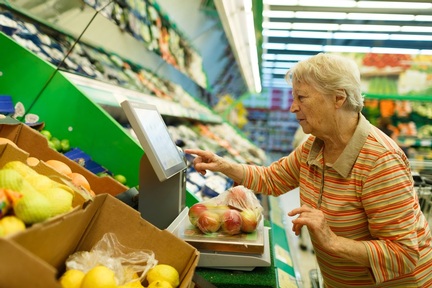Supermarkets urged to introduce 'slow lanes' for older people
Supermarkets across the UK are being encouraged to introduce 'slow checkout lanes' to benefit older people living in isolated areas by giving them a chance to experience the 'social aspect' of shopping.

Researchers at University of Hertfordshire have also called for shops to provide more seating areas and to use special offers to encourage people aged 60 and over to shop at quieter times of the week.
Wendy Wills, professor of food and public health at University of Hertfordshire, believes older people are at an increased risk of social isolation from well-intentioned efforts to get them to shop online.
She said: "Our research shows older people are more likely to have a wide range of factors working against them when it comes to sourcing, buying and preparing food.
"Industry and policymakers have a real opportunity to introduce practical and cost-effective measures that support older people to enjoy a healthy, affordable and safe diet, and to develop, or continue with, a positive relationship with food.
"Failure to act could result in older people’s food security, and therefore their health and well-being, declining at a faster rate, placing greater pressure on the NHS and care providers."
Researchers at University of Hertfordshire conducted a nine-month study, looking at the shopping habits of people aged between 60 and 93-years-old within 25 households.
They found that the tradition of a trip to the local shops or supermarket was being 'threatened' by the increasing popularity of online shopping.
Some shoppers also revealed how they felt 'disenfranchised' by buy-one-get-one-free offers that are targeted at families buying in bulk, or money-off offers which appeal more to higher spenders.
Researchers suggest encouraging older people to shop at quieter times of the week – by introducing special offers for the 'over 60s' during specific time periods – could make the supermarket a less stressful and more enjoyable shopping experience.
Dedicated checkouts with 'slow lanes' could also give older people a chance to talk to assistants, pack and pay for their shopping without feeling the pressure of holding others up.
Making meals-on-wheels services and lunch clubs more appealing is also considered a priority, particularly for those who are less mobile and rely on online shopping and home deliveries.
Professor Wills added: "There is a need to rejuvenate community food services like meals-on-wheels and lunch clubs to emphasise that they do offer older people a range of engaging activities that go beyond food, from nutrition screening and befriending schemes to exercise sessions."
The research comes after a Chester branch of Tesco became the first known supermarket to implement a 'dementia-friendly' checkout.
The Frodsham Street store has a clutter-free checkout which features clear images representing coins and their value. 'Dementia-friendly' staff also manage the checkouts to ensure the shopping experience is made easier for those living with dementia.
Hayley Sale, the store’s compliance manager, said: "We’re always looking for ways to improve the shopping trip for our customers and to support our local community. We knew that helping people with dementia would be hugely beneficial and are very happy to have installed the first clutter-free checkout, clear coin recognition signs along with dementia trained members of staff."
The research was funded by the Food Standards Agency and the Economic and Social Research Council.
Latest Innovative Care News
 13-May-19
'Pink drink' brain cancer treatment rolled out across NHS in memory of Baroness Jowell
13-May-19
'Pink drink' brain cancer treatment rolled out across NHS in memory of Baroness Jowell
 25-Apr-19
Louis Tomlinson helps 83-year-old who lost wife to dementia complete bucket list
25-Apr-19
Louis Tomlinson helps 83-year-old who lost wife to dementia complete bucket list
 05-Mar-19
Care worker of the year inspires nine-year-old son to work in care
05-Mar-19
Care worker of the year inspires nine-year-old son to work in care
 12-Feb-19
Michael McIntyre's jokes tested to see if they stop elderly catching flu
12-Feb-19
Michael McIntyre's jokes tested to see if they stop elderly catching flu
 25-Jan-19
Ninety-year-old and his dog can stay together, thanks to care worker
25-Jan-19
Ninety-year-old and his dog can stay together, thanks to care worker